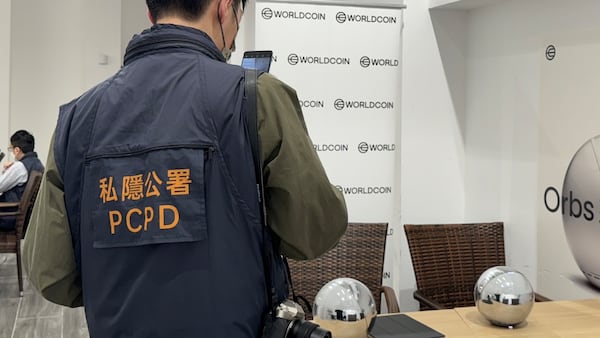- Hex Trust CEO Alessio Quaglini tells DL News custodians need regulatory clarity in Hong Kong.
- Hong Kong has been plagued by crypto crime wave as exchanges rip off investors.
- UK bank Standard Chartered has moved into Hong Kong's custody market.
As Hong Kong’s crypto exchanges race to submit licence applications by the end of February, the city’s regulators are turning their attention to other precincts of the crypto industry.
Officials are weighing rules around stablecoins and over-the-counter trading, as well as investor protection.
Yet one critical area remains in limbo: crypto custodians.
Clients’ money
In contrast to many of the players in Hong Kong’s freewheeling crypto scene, custodians actually want regulatory attention. As it stands now, exchanges are responsible for handling their own custody, which is not an ideal situation.
“They’re an exchange platform, right? They’re not supposed to hold clients’ money,” Alessio Quaglini, co-founder and CEO of Hex Trust, told DL News.
“Most of the platforms that actually failed, they failed exactly because they were holding clients’ money and they were utilising clients money for purposes other than the original purpose of providing an exchange,” he said in an interview.
Among them is FTX, which was based in Hong Kong at one time.
A degree of clarity may be on the way. On Tuesday, the Hong Kong Monetary Authority published guidelines on how institutions that accept deposits should safeguard client assets when using custodial services for crypto.
But these aren’t the regulations crypto custodians need.
To be sure, separating custodian services from exchanges would be a boon for outfits like Hex Trust.
Yet permitting exchanges to manage the digital assets of customers has proven to be one of the biggest causes of crypto failures and the vaporisation of billions of dollars worth of market value.
Hong Kong in particular has been plagued by an outbreak of crypto fraud tied to suspicious exchanges.
Letting exchanges keep custody of digital assets is at odds with trends in other countries, Quaglini says.
“Ironically, the whole world is moving in a different direction whereby exchanges should not do custody,” he said.
A spokesperson for the Securities and Futures Commission, or SFC, told DL News that it maintains regular dialogue with the industry but could not comment on specific measures.
A home in Hong Kong
The Hex Trust office occupies two floors in a plush building on Pottinger Street, right in the heart of Hong Kong.
The crypto custodian launched in 2018 with an eye toward cultivating institutional investors as customers, and it has since opened offices elsewhere in Asia, the Middle East, and Europe. It has $5 billion in assets under custody.
Hex Trust has been able to obtain licences in several of the places where it operates, such as Dubai. But on its home turf things have been more complicated.
‘Custody is really critical in the blockchain world. Much more than traditional finance.’
— Alessio Quaglini
Quaglini says Hong Kong’s virtual asset rules introduced two years ago were a logical first step on protecting retail investors. But it’s created a headache for companies focused on custody like Hex Trust.
They can’t service exchanges under current regulation. And there’s a lack of certainty as to where they stand in the crypto regulatory landscape.
“I understand the reason why the SFC has focused on regulating these exchanges, but the regulation has not covered other types of service providers in the industry, namely custodians,” Quaglini told DL News.
Initially, Quaglini considered having Hex Trust apply for an exchange licence so that its custodian services would be covered.
“But we thought it would be a little bit too complicated to explain ‘actually we’re not an exchange, we just applied for an exchange licence so that we can be as a custodian’,” he said.
Getting regulated is expensive. Last year, CoinDesk estimated that applying for a virtual asset licence in Hong Kong could cost as much as $20 million.
Much of that expense includes auditing and other compliance requirements. But under Hong Kong rules, crypto exchanges are also required to custody their own assets through an associated entity.
That unit “should not conduct any business other than that of receiving or holding client assets on behalf of the Platform Operator,” according to the SFC’s guidelines.
This requirement has led to duplication of in-house custodian services across the industry, significantly increasing operational costs and complexities for exchanges.
“If you have 30 exchanges for such a tiny market as Hong Kong, every exchange has to also be a custodian,” Quaglini said. “It becomes extremely expensive.”
‘Really critical’
Quaglini thinks the playing field must be clarified, plus it should be opened for specialised custodial players to provide services to market intermediaries.
He’s not alone. Other custodians have echoed this call. In October, Zodia Custody, a custody company backed by the UK bank Standard Chartered, launched in Hong Kong.
In November, Zodia CEO Julian Sawyer told Finance Asia that regulation in the city didn’t distinguish between crypto exchanges and custodians. Only those set up by exchanges were covered.
The possibility of regulating custodians appears to be at such an early stage it’s not even clear which agency would be responsible.
Zodia Custody said last year it was in ongoing talks with regulators at both the SFC and the Hong Kong Monetary Authority.
If the authorities are serious about cleaning up Hong Kong’s crypto scene custodians can help because they must run anti-money laundering and know-your-customer checks on customers, Quaglini said.
“Custodians are gatekeepers,” Quaglini said. “I believe that custody deserves specific regulations.”
Callan Quinn is DL News’ Asia Correspondent. Get in touch at callan@dlnews.com.







